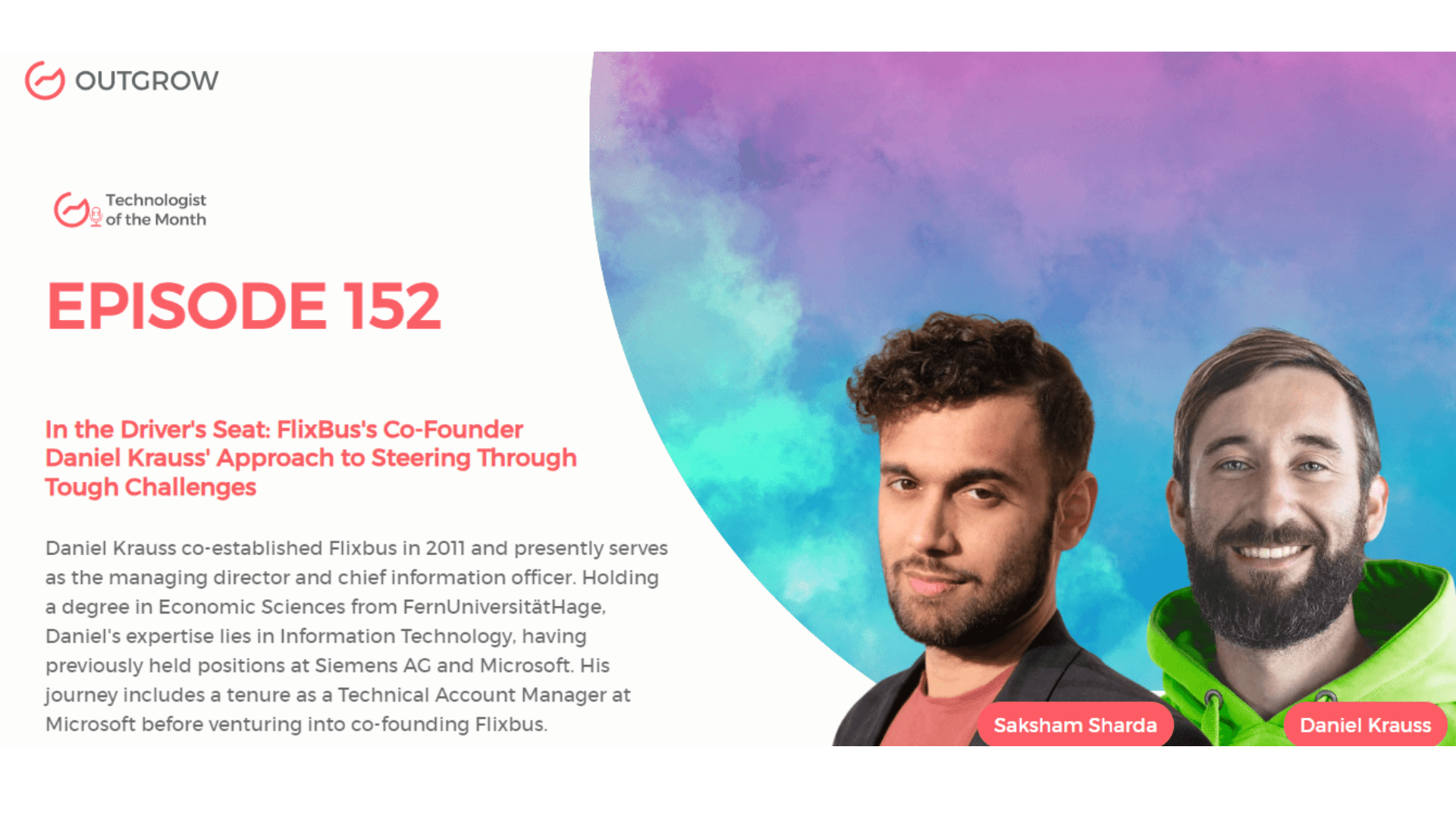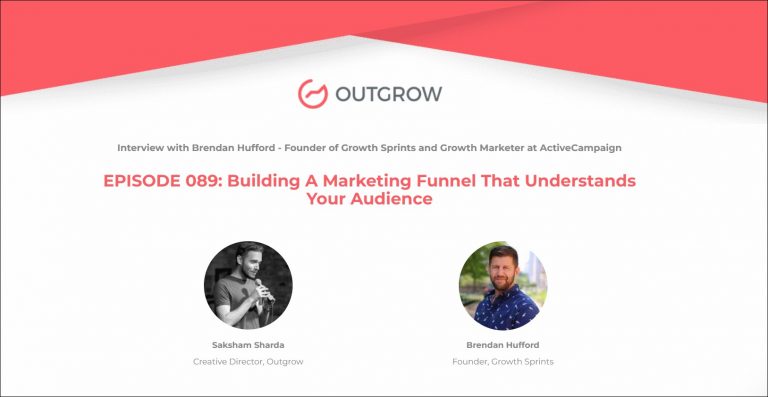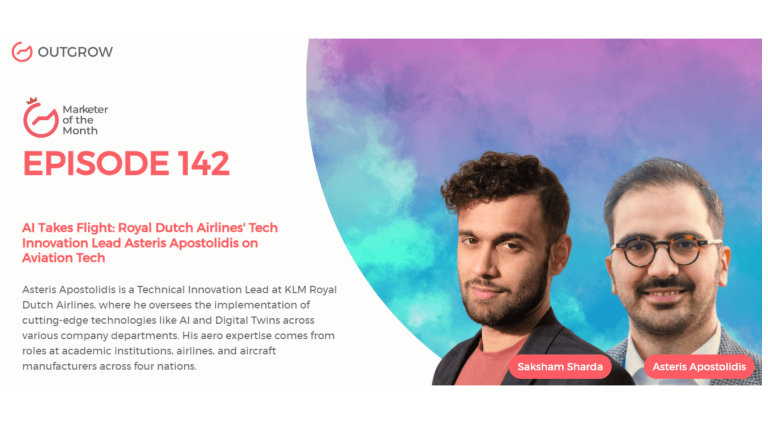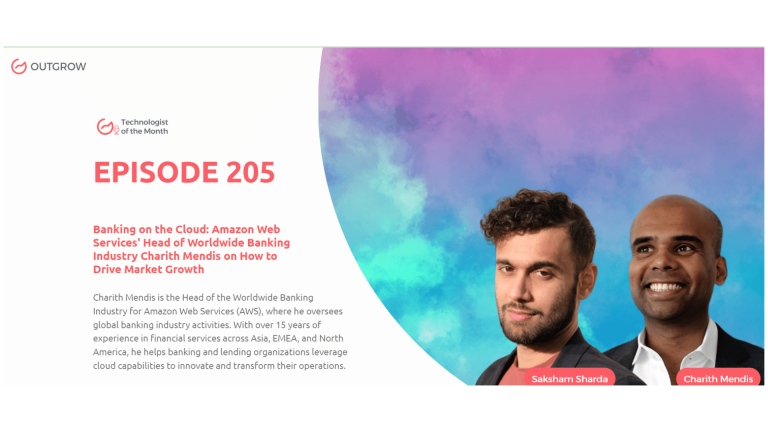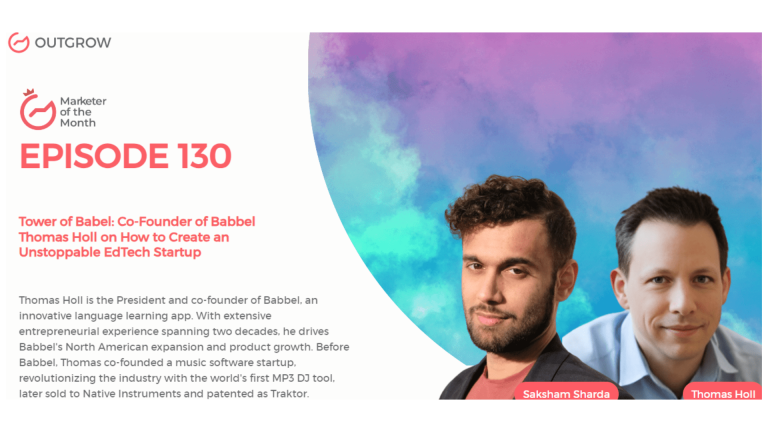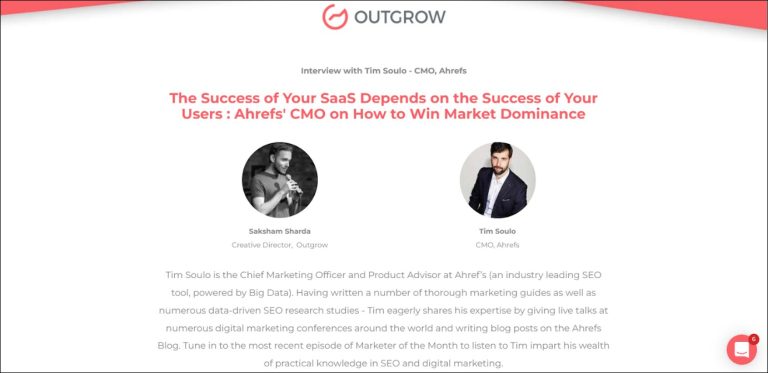EPISODE 152: Marketer of the Month Podcast with Daniel Krauss
Table of Contents
Hey there! Welcome to the Marketer Of The Month blog!
We recently interviewed Daniel Krauss for our monthly podcast – ‘Marketer of the Month’! We had some amazing insightful conversations with Daniel and here’s what we discussed about-
1. How creating tangible solutions lead to the establishment of FlixBus
2. Key learnings: Hiring experience and tech development
3. Sustainability focus: Transforming travel at FlixBus
4. Tech-driven future: AI and autonomous driving
5. Leadership insights: Collaborative decision-making
6. Flixbus’s stance: Addressing social issues, fostering inclusivity
About our host:
Dr. Saksham Sharda is the Chief Information Officer at Outgrow.co. He specializes in data collection, analysis, filtering, and transfer by means of widgets and applets. Interactive, cultural, and trending widgets designed by him have been featured on TrendHunter, Alibaba, ProductHunt, New York Marketing Association, FactoryBerlin, Digimarcon Silicon Valley, and at The European Affiliate Summit.
About our guest:
Daniel Krauss co-established Flixbus in 2011 and presently serves as the managing director and chief information officer. Holding a degree in Economic Sciences from FernUniversitätHage, Daniel’s expertise lies in Information Technology, having previously held positions at Siemens AG and Microsoft. His journey includes a tenure as a Technical Account Manager at Microsoft before venturing into co-founding Flixbus.
In the Driver’s Seat: FlixBus’s Co-Founder Daniel Krauss’ Approach to Steering Through Tough Challenges
The Intro!
Saksham Sharda: Hi, everyone. Welcome to another episode of Outgrow’s Marketer of the Month. I’m your host, Dr. Saksham Sharda, and I’m the creative director at Outgrow. co. And for this month we are going to interview Daniel Krauss who is the managing director and CIO of FlixBus.
Daniel Krauss: Great to be here. Thank you.
Don’t have time to read? No problem, just watch the Podcast!
Or you can just listen to it on Spotify!
The Rapid Fire Round!
Saksham Sharda: Let’s start with the rapid-fire round. The first one is at what age do you want to retire?
Daniel Krauss: Hopefully as late as it gets. So I don’t know. 70-80. Maybe 90.
Saksham Sharda: How long does it take you to get ready in the mornings?
Daniel Krauss: Half an hour, maybe?
Saksham Sharda: Most embarrassing moment of your life?
Daniel Krauss: Oh, I don’t remember.
Saksham Sharda: Favorite color?
Daniel Krauss: Green.
Saksham Sharda: What time of day are you most inspired?
Daniel Krauss: In the morning.
Saksham Sharda: How many hours of sleep to survive?
Daniel Krauss: I need six
Saksham Sharda: Fill in the blank. An upcoming technology trend is ________.
Daniel Krauss: Well, artificial intelligence.
Saksham Sharda: The city in which the Best Kiss of your life happens.
Daniel Krauss: Well, my hometown, of course.
Saksham Sharda: Pick one. Mark Zuckerberg or Elon Musk?
Daniel Krauss: Neither.
Saksham Sharda: The biggest mistake of your career?
Daniel Krauss: Well, I’m very happy with my career.
Saksham Sharda: How do you relax?
Daniel Krauss: Running.
Saksham Sharda: How many cups of coffee do you drink per day?
Daniel Krauss: On average, five.
Saksham Sharda: A habit of yours that you hate?
Daniel Krauss: Well, when I’m nervous, I’m playing around with my fingers.
Saksham Sharda: The most valuable skill you’ve learned in life.
Daniel Krauss: I enjoy working with human beings.
Saksham Sharda: Your favorite Netflix show.
Daniel Krauss: I don’t watch Netflix.
Saksham Sharda: Are you an early riser or a night owl?
Daniel Krauss: Rather early.
Saksham Sharda: One-word description of the leadership’s time.
Daniel Krauss: Very trustful.
Saksham Sharda: Top priority and your daily schedule.
Daniel Krauss: Communication with my people,
Saksham Sharda: Ideal vacation spot?
Daniel Krauss: It’s more about who slashed my family rather than where.
Saksham Sharda: Key factor for maintaining a work-life balance.
Daniel Krauss: Stitching it together. It’s more of a blending than a balance.
Saksham Sharda: Memorable career milestone.
Daniel Krauss: Having founded flicks.
Saksham Sharda: A recent business innovation that caught your attention.
Daniel Krauss: Essentially, that comes back to large language language models. So slash AI.
Saksham Sharda: The last song you’ve been listening to?
Daniel Krauss: Oh, my God. I didn’t know it was this morning. I don’t know.
Saksham Sharda: So the follow-up question is can you comment for us?
Daniel Krauss: No. And if so you wouldn’t want to.
Saksham Sharda: The last movie that you saw that had a good impression on you.
Daniel Krauss: The last movie I saw was the Paw Patrol movie together with my son.
The Big Questions!
Saksham Sharda: That’s the end of the rapid-fire round. Let’s go on to the larger question. The first one is Can you share a bit about your journey, from your time at Hochschule Ansbach to founding FlixBus and your current role as Founder and chief Organizational Plumber?
Daniel Krauss: Sure thing. So basically, Ansbach was the University of Applied Science I studied first. The reason I chose that which is close to my hometown is because I worked more for Siemens back in the day than I studied. The reason is that working on creating something tangible always drove me. After having finished my studies then took on a couple of journeys, including, you know, a step in the US. I came back to Munich, where I rejoined Andrey, one of my two co-founders. And basically, we have known each other for more than 30 years. And we started talking about how kind of almost ridiculous the golden hamster wheel is for strategy consultants at BCG, or at Microsoft, or Microsoft, for a tech consultant. What I did was and we thought, hey, maybe we can do better. And that started when we went through a bunch of ideas, a bunch of problems, and improvement thoughts. And at some point in time, we ended up with Flicks. Basically, because of the news. We read in the news that the former government in Germany wanted to deregulate the German long-distance coach market and we took that bet. We, three of us, co-founded Flicks, and that became true when the market opened up. And we started with our partnership model, you know, with bringing our midsize bus partners together on a very tech-driven platform. And therefore, you know, started the core of what, meanwhile, is around in 42 countries. And, you know, the reason why I’m still heading technology products and people making the chief organizational plumber is the studies back at the University of Applied Science, which was business information systems. So I’m a bit of a techie at heart. But essentially, what I love doing is organizational building, and working with people. And you know, that means you basically, plumb all the obstacles and everything, which kinda like, are in the way of, of the flexes to do great stuff to deliver great customers while you. And I think that’s not only true for me, I just make it explicit with that funny term. It’s true for every leader, as a leader, you take care of whatever can’t be sold by the people. And that means daily, you have to pay them quite a bit to keep the machine running.
Saksham Sharda: So what are the key pivotal zombie moments that have tested your results in your time and fixes?
Daniel Krauss: So first, you know, you tend to work with, you know, interns and juniors, not only because they’re cheap, but also because you get them quickly. But apparently, it’s hard for them to take full accountability, because they have barely as much experience as you have yourself. So I’d rather really look for a more experienced leader and quicker if I do it a second time, hire, you know, experience in general. If you do that, and you hire particular people for certain tasks, who are better than yourself, it’s way easier to start delegating properly. And delegating is one of the key elements I’ve mentioned. If you then flip the coin towards technology, I think in the beginning, we were a bit hesitant to take proper investment. So it took us too long to build up our internal tech team, we relied on external resources. And, you know, for all the core services of each business, you better do it yourself and not rely on externals. And you know, we had to clean up afterward. So these were two, you know, larger learnings, which I had to Plum afterward.
Saksham Sharda: So Flix for us has been a pioneer in green mobility, what inspired you to focus on making travel more sustainable? Was it a government thing as well? And what challenges did you face in implementing this vision?
Daniel Krauss: The truth is, initially, we wanted to bring smart and green mobility, so sustainable and affordable mobility to all people, because we thought, you know, individual traffic is expensive. Some other alternatives, like governmental train services, are expensive. So that was what drove us. And, you know, very quickly after there were studies from the German government, that per head per passenger, the carbon dioxide footprint is even better with buses than it used to be with trains. And we were a bit surprised back then. But we took that, and obviously, you know Flicks are very good in bringing economic sense together. We need a high load factor, so many people in our buses are successful from a commercial point of view in an economical sense. But that also leads to many people sharing the same mode of transportation, which reduces obviously, the carbon footprint per head. And essentially, when that turned out to be true, and we realized, we kind of try to just scale that. And with the scale, the responsibility grows. That means we not only do what we did well in the past with the most modern combustion engines, but we also started with our ESG reward to think about how in the next 10 to 15 years, we can convert in Europe or a fleet, to even a more sustainable EV powered kind of thing. Because we believe this is what is important. And as a good member of the transportation community and a successful company, we have to take that responsibility.
Saksham Sharda: So what do you think about all the flight costs that different European nations are implementing to a degree?
Daniel Krauss: I believe if the infrastructure is there, and I think France is a good example, if you have a high-speed train or a certain bus connection, which is reliable and you know, in a good shape, then obviously it doesn’t make sense to have short-haul flights. So I believe we will see what France implemented across different European nations over the next couple of years. And we are very supportive not only with Flick’s buses but in that high-speed sector essentially also with FlixRay.
Saksham Sharda: Speaking of all this innovation as a founder of Flix, you’re deeply involved in the intersection of technology and mobility. How do you see technology shaping the future of transportation itself, especially In the context of Flixbus?
Daniel Krauss: We have mentioned briefly all across and around the Web Summit, artificial intelligence. And they’re kind of different things. There are NLP and large language models, and there is machine learning, which we do already to optimize our network planning. But if you look at that particular intersection, I believe autonomous driving will play a key role. And we won’t wait until level five is there. But there are intermediary solutions, like remote controlled driving, supported by artificial intelligence, which really can help us to increase the service level, to our customers, and eventually ease the lives of our drivers, we must not forget, this is one of the super responsible jobs we’ve offered out there, not only for the bus drivers, but also, you know, for the train chiefs, and that together with AI can improve. And that will lead to eventually becoming a more attractive chap in the future. Because, I mean, there is no magic, we have driver shortages, and it is a scarce resource and becomes more challenging over COVID. We try to fight against that, you know, by offering an attractive job itself. But I believe, with these kinds of technologies, eventually, you know, getting up at home, having a coffee with your family and doing a remote controlled, you know, bus stop to highway session, and then eventually on the highway, even at some point, which is, you know, contained system, it can be fully remote and fully autonomous. And then another driver can pick it up. And you don’t have to always sleep out of home and things like that, which eventually really will upgrade the chief quite a bit and hopefully lead to attracting more future bus drivers and train chiefs,
Saksham Sharda: Any issues around safety that have been raised in this instance?
Daniel Krauss: Well, I believe you have to always put safety first, we’re a transportation company, and we move people from A to B, and we do that not only sustainable and affordable, but safety first, that means you can try out these technologies, you know, without customers yet in a contained system that before it has been rolled out there is regulatory, and there is safety, which has to be compliant 100% before you really move customers or even put drivers at risk.
Saksham Sharda: Okay. So being the chief organizational plumber still sounds very intriguing. Can you share a lesson learned from a leadership decision that didn’t go as planned? And how did you adjust your approach to improve future plumbing strategies?
Daniel Krauss: So basically, if I remember, the leadership decisions, which didn’t go as planned, it’s mainly about two things. A, I didn’t hear my gut feeling and to, you know, my personal experience with it, which I couldn’t clearly express, but it was rather gut feeling. Or I didn’t involve our people enough. So I thought I was smarter than the rest and just took the decision based on the role. And both of these decisions led to more plumbing efforts. So, on the other hand, if you take an example where I took a risk in a leadership decision, and even had a large reorganization at Flix tech, and asked the people how they would reorganize and really gave them the autonomy and just adjusted a bit here and there. Well basically that works much better and we didn’t have invented here syndromes or people trying to stick you know, and not being able to let loose, and also accountability and business continuity were way smarter. So I believe whenever I took rather joint decisions, being fully aware that the final accountabilities on me, based on my role, were always better than I thought I was smarter than the rest for whatever reason or decided against my gut.
Saksham Sharda: So speaking of delegation, delegating power and responsibility, how many people report to you, and how many people report to them?
Daniel Krauss: It always depends, you know, sometimes you have to fill the gaps. Currently, I’d say there are 14 or so reporting directly to me. And the entire organization I’m in charge of is Flix tech on the one hand, and our people team, on the other hand, is about 550.
Saksham Sharda: Okay, so what does your typical day look like?
Daniel Krauss: So after half an hour or two, you know, kind of take a shower and have the first coffee. Usually, during the day, I have quite a few meetings. It’s a mixture of, you know, one-to-one to make sure you know. I understand individual problems and support, you know, resolving them, but also talking to my people, and how you know, how I can support them growing. On the other hand, there’s kind of group meetings where we have sugar fixes to take, you know, joint decisions. And that’s from the management board and sea level perspective, down to the individual group, group sessions, where we tackle individual topics. And that’s mainly what it is, sometimes due to the management board role. It’s also like interviews and stuff as we do it today. And later on in the day, so to say, you know, I do kind of my homework, I just take care of my inbox. I read presentations, and I comment on slides and these kinds of things. And, yeah, that’s kind of like the after-hour work, and during the week, where I’m most of the time out of home. So you know, being around somewhere like here in Lisbon, I barely do anything else besides having dinner and work. And that’s a good thing. I still enjoy it very much.
Saksham Sharda: So your book, Mission Zukunft Republik focuses on the future of books. Can you share some key insights and your vision for an agile, inclusive, humane working environment?
Daniel Krauss: So we must not forget that in the 21st century, different from the 19th and 20th centuries, it’s not about, you know, humans doing repetitive tasks. And it’s also not about, you know, some of the fear and the uncertainty about, again, artificial intelligence, kind of stealing our jobs, I believe, you know, the brain, which powers our society to keep on doing better things, innovation, all that stuff, remains human. And that means we have to focus on the human factor. And I believe that this means mentioning and focusing and putting the human being much more in the middle of doing not only the output but the outcome. That’s something which in the future is much more important and became even more prescient after COVID, you know when it didn’t matter so much where we are working. But how we work, you know, we had to work from home here and there. But essentially, it’s also not only about working remotely but bringing people together, because the topics we as human beings have to solve are very complex, as our society is complex. So you know, re-centering the human being around the act of doing business is something which I believe the 21st century only has started with. It’s also being pointed out in the book to come to the Republic. So we probably got the future, it’s the English term.
Saksham Sharda: So in your interaction with the readers of this book, have there been any unexpected perspectives or stories that challenged your views regarding work?
Daniel Krauss: Well, there’s always the case, because we must not forget that, you know, they’re individual small societies, like the organization of a company like Flix. They are larger societies, like a nation, a country, and then there’s Europe. And then there’s the world. And we have biases, we’ve been socialized differently. So there’s a bunch of different views. And to have an open and honest discussion about that, without any hate or violence, just to make sure what we want to do to develop our society further and to protect the planet. That’s very controversial. And therefore there were many interactions because many different people have read the book. I always try to get the feedback, think about that, and then eventually start a discussion with hopefully a good outcome for all of us.
Saksham Sharda: Speaking of hate and violence Flixbus, under your leadership has taken a strong stand against anti-semitism. How do you see the role of companies in addressing social issues and what motivated Flixbus to take this clear stance?
Daniel Krauss: In general Flex is not a political company. I mean, we’re a company, we’re here to provide good services to our customers. But sometimes, unfortunately, things happen, which are, you know, so much not to be imagined, whether it’s the war in Ukraine, there’s some, you know, nature catastrophes, or there was a terror attack of the Hamas, where I believe you have to voice, your point of view. And particularly as a German company, we have a responsibility. And we’re against anti any, you know, way of anti-Semitism, but hate and you do bad things in general. And therefore, we had to take that stand as a German company. And on top of that, we repeat that, as I said, any hate, any violence, anything independent of the background, the color, the nation, religion, we are against, we believe, you know, only jointly in a good sense, humanity can progress. And that’s something we support as a company. And I believe our purpose is very much, you know, stating that, and that was one of the reasons we were also crystal clear on the terror attack of Hamas.
Saksham Sharda: How do you approach conversations with team members who may hold diverse opinions on such controversial issues? And how do you foster a culture of open dialogue with them?
Daniel Krauss: Very good question. So we had that a couple of times already, whether, you know, we have a bunch of people, we have, obviously, Ukrainian people, and we have Russian people. And we have, you know, Muslim people, and we have Jewish people. And we want to have that very colorful environment. Also independent of you know, if you’re just what kind of letter of LGBTQI plus you think your own is, you know, you sit together and just discuss openly, and we are always receiving the feedback, we take that into our own hands, we try to reflect on that. And being very open and humble is the key to these discussions. And you know, the culture we’ve created is independent of your sexuality or your religion or your passport. And I’m very proud that I’m saying all of our Flix, people really signed up for that, and therefore we can have these discussions.
Saksham Sharda: Okay, so let’s move back to regulatory tech now. How do you navigate regulatory challenges within the European Union, fostering a culture of innovation in your tech?
Daniel Krauss: Well, I’m glad you took your bus. Thanks, unfortunately, could have been even worse. Well, it’s an ongoing discussion. You know, there’s legacy. And there were reasons in the past why regulators took certain decisions. And, you know, regulation is there to protect all of us. And protection sometimes means that means you’re a little bit slow in, you know, encountering new things. And also there, we take the stance of open discussions being very transparent and not hiding things. And we started individual discussions with municipalities with countries also at the European level. And I have to admit the EU in that sense, even though sometimes it’s been badly touched in the news. And that sense is very helpful to make sure we can foster deregulation in a certain sense, especially if it provides better and additional services to our customers. And, you know, that means just repeating the message proving your point of view and that there is actual value towards the customers. And then it takes time.
Saksham Sharda: Constraint posed a significant hurdle for technological innovation in a fixed puzzle, any kind of innovation?
Daniel Krauss: Well, yes, and no, I believe we fortunately never had a real burden. You know, for instance, if we talk about artificial intelligence, we started years ago, mainly around machine learning. And therefore, it was, you know, mathematical anonymous data. So I don’t have any problem with any AI there. We were happy because we were born because of deregulation. I believe, you know, if you look at the German train market, I believe, you know, making the train infrastructure a bit more independent, eventually carrying it out of the government, governmental own player would make more sense and speed up things in the railway market in Germany, and therefore also support Flix train, particularly, you know, the customers with a better offer and cheaper prices eventually. And that’s also true for other nations, you know, we’re in good discussions, friends as well. But outside of that, we were always lucky to, you know, have found a way to put innovation in place and make good things towards our customers.
Saksham Sharda: So the last question for you is of personal kind. What would you be doing in your life if not this right now?
Daniel Krauss: That’s a good question. I’m happy to not have to answer that directly. Because I keep on doing that. As long as the company needs me I believe I can bring value and plumb some things. I guess, you know, as a child, like my little son, by the way, I wanted to become a pilot and then I really for some time didn’t know what I wanted to do in my life. I think I couldn’t back then really listen to my gut and explicitly state that entrepreneurship is what I really enjoy and therefore I love what I do.
Let’s Conclude!
Saksham Sharda: Thanks, everyone for joining us for this month’s episode of Outgrow’s Marketer of the Month. That was Daniel Krauss who is the managing director and CIO of FlixBus.
Daniel Krauss: Pleasure. Thanks for having me.
Saksham Sharda: Check out the website for more details and we’ll see you once again next month with another marketer of the month.

Muskan is a Marketing Analyst at Outgrow. She is working on multiple areas of marketing. On her days off though, she loves exploring new cafes, drinking coffee, and catching up with friends.

